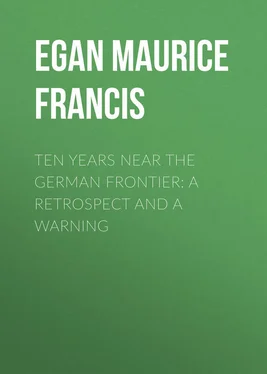Maurice Egan - Ten Years Near the German Frontier - A Retrospect and a Warning
Здесь есть возможность читать онлайн «Maurice Egan - Ten Years Near the German Frontier - A Retrospect and a Warning» — ознакомительный отрывок электронной книги совершенно бесплатно, а после прочтения отрывка купить полную версию. В некоторых случаях можно слушать аудио, скачать через торрент в формате fb2 и присутствует краткое содержание. Жанр: foreign_antique, foreign_prose, на английском языке. Описание произведения, (предисловие) а так же отзывы посетителей доступны на портале библиотеки ЛибКат.
- Название:Ten Years Near the German Frontier: A Retrospect and a Warning
- Автор:
- Жанр:
- Год:неизвестен
- ISBN:нет данных
- Рейтинг книги:5 / 5. Голосов: 1
-
Избранное:Добавить в избранное
- Отзывы:
-
Ваша оценка:
- 100
- 1
- 2
- 3
- 4
- 5
Ten Years Near the German Frontier: A Retrospect and a Warning: краткое содержание, описание и аннотация
Предлагаем к чтению аннотацию, описание, краткое содержание или предисловие (зависит от того, что написал сам автор книги «Ten Years Near the German Frontier: A Retrospect and a Warning»). Если вы не нашли необходимую информацию о книге — напишите в комментариях, мы постараемся отыскать её.
Ten Years Near the German Frontier: A Retrospect and a Warning — читать онлайн ознакомительный отрывок
Ниже представлен текст книги, разбитый по страницам. Система сохранения места последней прочитанной страницы, позволяет с удобством читать онлайн бесплатно книгу «Ten Years Near the German Frontier: A Retrospect and a Warning», без необходимости каждый раз заново искать на чём Вы остановились. Поставьте закладку, и сможете в любой момент перейти на страницу, на которой закончили чтение.
Интервал:
Закладка:
The question of war was even then, in 1908, in the air. The German diplomatists were polite to Fallières, but they considered him heavy and bourgeois , and believed that he represented the undying dislike for Germany which the French system of education was inculcating.
'If the French schools teach the rising generation to hate Germany, what is the attitude of the German educators?' I asked.
'We know that we are hated, and we teach our young to be ready for an attack from wherever it comes; but we love peace, of course.'
In 1908, it was generally thought that the Kaiser himself was inclined to keep the peace. Now and then an isolated Englishman would declare that he had his doubts, when a German traveller seemed to know too much about his country, or when amiable German guests asked too many intimate questions.
It was the custom for the older colleagues to offer the newer ones a history of the Slesvig-Holstein dispute, which dated from the fifteenth century. On my arrival, Sir Alan Johnston had presented me with a volume on the subject by Herr Neergaard, considered the 'last word' on the subject. The pages, I noticed, were uncut, so I felt justified in passing it on to the newest colleagues, taking care, in order to give him perfect freedom, not to autograph it!
It was, as a French secretary often said, 'a complication most complicated'; but one fact was clear – the deplorable position of a liberty-loving people, deprived of the essentials that make life worth living!
The great barrier to the entire domination of Prussian ideals in this area between the Baltic and the North Sea is the existence of the Danish national spirit in Slesvig. 'If the other nations of Europe had looked ahead, the power of Prussia might have been held within reasonable bounds; the war in 1870 would have been impossible; this last awful world-conflict would not have occurred. Germany would have been taught her place long ago.' How often was this repeated!
The relations between the Emperor William and the Emperor of Russia were supposed to be unusually friendly then, after the practical defeat of Russia by Japan. In older days, Queen Louise of Denmark thought she had laid the foundation for a certain friendliness; but, nevertheless, the Tsar, though closely related to the Kaiser and dominated largely by his very beautiful German wife, was never free to ignore the Slavic genius of his people. Kings and emperors – all royal folk – made up a family society of their own until this war. We have changed all that, as the man in Molière's comedy said; and yet, as a rule, German royal princesses remained Prussian in spite of all temptation, while other women seemed naturally to adopt the nationalities of their husbands. The princesses connected with the Prussian royal house seem immutably Prussian.
The Tsar, then, like the Kaiser, cousin of the King of England, the son of a mother who remembered Slesvig-Holstein and never liked the Prussians, had second thoughts. (They were nearly always wrong when his wife influenced them.) It was one thing to call the mighty Prussian 'Willie' – all royalties have little domestic names – another to break with France and to bow the Slavic head to German benevolent assimilation. The Tsar might call the Emperor by any endearing epithet, but that did not imply political friendship; King George of Greece and Queen Alexandra were very fond of each other, but the queen would never have attempted to give her brotherly Majesty the Island of Crete which he badly wanted. With the death of the queen of Christian IX., assemblies of royalties ceased in Denmark; the old order had changed.
There was no neutral ground where the royalties and their scions could meet and soften asperities by the simplicity of family contact.
The point of view in Europe had become more democratic and more keen.
Even if there had been a Queen Louise to try to make her family, even to the remotest grandchild, a unit, it could not have been done. Reverence for royalty had passed out with Queen Victoria; the idols were dissolving, and restless ideals became visible in their places.
Prussia had drawn her states into a united empire; tributary kings were at the chariot wheel of the Prussian Emperor, not because the kings so willed, but because the subjects of the kings – the commercial people, the landowners, the military caste, the capitalists, the increasingly prosperous farmers – discovered it to be to their advantage.
Bismarck's policy of blood and iron meant more money and more worldly success for the Germans. Although the smaller Teutonic states had lost their freedom, Bismarck began to pay each of them its price in good gold with the stamp of the empire upon it. To take and to hold was the motto of the empire: – 'We take our own wherever we find it!'
The old Germans disappeared; the Germans who were frugal and philosophical, poor and poetical, were emerging from the simplicity of the past to the luxury of the present.
As a rule, I found the Russian diplomatists very well informed and clever. Their foreign office seemed to have no confidants outside the bureaucratic circle. The Russian journalist, like most other journalists, was not better or earlier informed of events than the diplomatists. As Copenhagen was the place where every diplomat in the world went at some time or other, one was sure to discover interesting rumours or real news without much trouble.
While the newspapers or magazines of nearly every other nation gave indications in advance of the public opinion that might govern the cabinets or the foreign offices, the Russian periodicals gave no such clues. There was no use in keeping a Russian translator; real Russian opinion was seldom evident, except when a royalty or a diplomatist might, being bored by his silence, or with a patriotic object, tell the truth.
'What prevents war?' I asked in 1909 of one of my colleagues.
'Lack of money,' he answered promptly, repeating the words of Prince Koudacheff. 'Germany and Russia will fly at each other's throats as soon as the financiers approve of it. You will not report this to your Foreign Office,' he said, laughing, 'because America looks on war, a general European war, as unthinkable. It would seem absurd! Nobody in America and only ten per cent. of the thinking people in England will believe it! As for France, she is wise to make friends with my country, but she would be wiser if she did not believe that Germany will wait until she is ready to make her revanche . There are those in her government who hold that the revanche is a dream – that France would do well to accept solid gains for the national dream. They are fools!'
'Iswolsky is of the same opinion, I hear,' I said, for we had all a great respect for Iswolsky. But when the London National Review repeated the same sentiments over and over again, it seemed unbelievable that the Kaiser's professions of peace were not honest. Yet individual Pan-Germans were extremely frank. 'We must have our place in the East,' they said; 'we must cut the heart out of Slavic ambitions, and deal with English arrogance.' In a general way, we were always waiting for war.
In 1909, Count Aehrenthal, then a very great Austrian, told a celebrated financial promoter who visited our Legation, that war was inevitable. The Austrians and the Russians feared it and believed it – feared it so much that when I was enabled to contradict the rumour, there was a happy sigh as the news was well documented. Austria did not want war; Russia did not want war.
'But the Emperor of Germany?' I asked of one of the most honourable and keenest diplomatists in Berlin.
'He is surrounded by a military clique; he desires to preserve the rights and prerogatives of the German Empire, above all, the hereditary and absolute principle without a long war. A war will do it for him – if it is short. He himself would prefer to avoid it. Yet he must justify the Army and the Navy; but the war must be short.'
Читать дальшеИнтервал:
Закладка:
Похожие книги на «Ten Years Near the German Frontier: A Retrospect and a Warning»
Представляем Вашему вниманию похожие книги на «Ten Years Near the German Frontier: A Retrospect and a Warning» списком для выбора. Мы отобрали схожую по названию и смыслу литературу в надежде предоставить читателям больше вариантов отыскать новые, интересные, ещё непрочитанные произведения.
Обсуждение, отзывы о книге «Ten Years Near the German Frontier: A Retrospect and a Warning» и просто собственные мнения читателей. Оставьте ваши комментарии, напишите, что Вы думаете о произведении, его смысле или главных героях. Укажите что конкретно понравилось, а что нет, и почему Вы так считаете.












